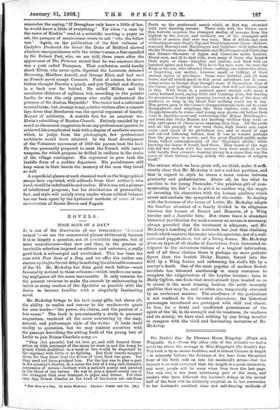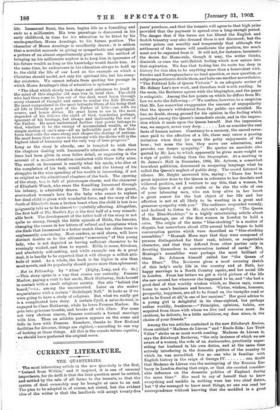The Needle's Eye. By Florence Morse Kingsley. (Funk and Wagnalls.
6s.)—From the other side of the Atlantic we hail a novel far above the average in Miss Kingsle3r"s The Needle's Eye. The book is by no means faultless, and is almost Chinese in length —it minutely follows the fortunes of the hero from the actual hour of his birth well on into his manhood's prime—but the interest is so well sustained that the length is a great attraction, and most people will be sorry when they turn the last page. The end, too, is the least convincing part of the story, and readers who have followed the heroine's doings in the second half of the book will be distinctly sceptical as to her conversion ' to her husband's excellent aims and self-denying methods of life. Immanuel Rossi, the hero, begins life as a foundling and ends as a millionaire. His, true parentage is discovered in his etirly childhood, in time for his education to be fitted by *his uncle-guardian, Moses Armitage, to his future position. The :character of Moses Armitage is excellently drawn ; it is seldom that .a novelist succeeds in giving no sympathetic and unpriggish a picture of an almost superhumanly good man. His method of bringing up his millionaire nephew is to keep him in ignorance of his future wealth as long as the knowledge would dazzle him. At the same time, he endeavours in his education always to hold up to the child the life of our Lord as the example on which a Christian should model, not only his spiritual life, but his every- day existence. We cannot refrain from quoting the passage in .which Moses Armitage's idea of education is epitomised :—
' "The ideal which slowly took shape and substance to itself in the mind of this singular old man was in brief this. The child who had thus come to him out of the dark must learn through every channel of thought and sense to realise the Life Eternal. He must comprehend in the most intimate fibres of his being that all life is literally a part of the Father of Life—one with its source, and hence divine. He must learn to see in the most degraded of his fellows the child of God, wandering perhaps, ignorant of his heritage, but always and inalienably the son of the Father. He must understand further that power belongs to God, whether it be the energy of accumulated wealth, or the simple motion of one's arm—all an indivisible part of the God- force that rolls the stars along and shapes the destiny of nations.
He must learn that to move in harmony with the divine will is the highest ideal of humanity and the only way of true progress."
Long as the story is already, one is tempted to wish that the 'chapters dealing with Immanuel's education on the above lines had been given in even fuller detail, so engrossing is the acccinnt of a modern education conducted with these lofty aims. The result on Immanuel is exactly what his uncle, who dies at the completion of his task, would wish; and the history of his Struggles in the wise spending of his wealth is interesting, if not so original as the educational chapters of the book. The opening Of the .story, too, is full of picturesque charm, and the character of Elizabeth Winch, who rears the foundling Immanuel through his infancy, is admirably drawn. The strength of the gaunt, overworked woman's love for the baby who comes to replace her dead child is given with wonderful force, and the story of the ileath of Elizabeth from a broken heart when the child is lost is so poignantly told as to be almost ten painfully affecting. Altogether, the first half of The Needle's Eye is the first half of a very remark- able book. The development of the litter half of the story is not quite so strong, though the little episode of Hilda, the heroine, changing the names in her letters of refusal and acceptance when she finds that Immanuel is a better match than her other lover is unpleasantly convincing. Most readers, as said above, will have distinct doubts as to the ultimate "conversion" of this young lady, who is not depicted as having sufficient character to be musingly wicked, and then to repent. Hilda is mean, frivolous, and absolutely self-seeking, and while example can do a great deal, it is hardly to be expected that it will change a selfish atti- tude -of Mind. As a whole, the book is far higher in aim than most novels, and its popularity should prove more than ephemeral.
. . Not in Fellowship. By "Alien." (Digby, Long, and Co. 6s.) —This story opens in a way that rouses our curiosity.' Frances Marlow, paying a visit to her uncle, Mark Hathaway, finds herself in contact with a small religious society. She sits "behind the board,"—i.e., among the unconverted. Later on she makes acquaintance with a certain "Hallelujah Nell." It looks as if we were going to have a study of religions. But what we really get is a complicated love story. A certain Cyril, a ne'er-do-weel, is engaged to Clare Hathaway, while he loves Frances Marlow. He gets into grievous trouble, and breaks off with Clare. For some not very obvious reason, Frances contracts a formal marriage with him. Then an athletic parson appears on the scene and • falls in-love with Frances. Somehow, thanks to New Zealand facilities for divorces, things are righted,—according to one way. . of looking at these things. All this is the crambe totiens repetita ; we-should have preferred the original menu.























































 Previous page
Previous page